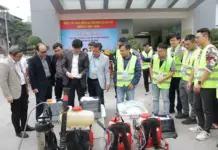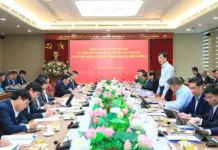The President of the Ho Chi Minh National Academy of Politics (HCMA), Nguyen Xuan Thang, recently held a working session in Hanoi with the Chancellor of the Korea National Diplomatic Academy (KNDA), Park Cheol-hee, as reported by VNA.
Thang stated that the Vietnam-Republic of Korea relationship is currently at its strongest point since the establishment of diplomatic ties between the two countries in 1992.
He emphasized the rapid and effective development of ties in the fields of politics, diplomacy, national defense and security, economy, and trade over the past three decades. Vietnam’s priorities include promoting trade, science, and investment, with a particular focus on energy transition, green transformation, artificial intelligence, and semiconductor technology.
| Delegates at the working session. Photo: CPV |
With Vietnam becoming an increasingly preferred destination for leading global semiconductor corporations such as Intel and Samsung, Thang expressed a strong interest in furthering cooperation in this critical sector.
He also envisioned an expansion of collaboration in the industrial supply chain, semiconductor technology, carbon neutrality, trade facilitation through greenhouse gas reduction, clean energy, expanding rules of origin and core mineral resources.
Park, on his part, expressed a desire for enhanced cooperation through specialized training provided by HCMA to Korean officials and lecturers, as well as trainees. He also expressed interest in organizing a semiconductor forum.
Both sides discussed and agreed to cooperate on climate change response, particularly in maritime security in the region.
During a seminar on maritime security cooperation in the region and cooperation in the Greater Mekong Sub-region co-organized by HCMA and KNDA, the two sides reached a consensus on key measures to create a safe maritime environment, emphasizing the political will of countries to coordinate their actions.
They emphasized the importance of collective efforts involving organizations or countries rather than unilateral and separate actions.
They also emphasized the need to implement existing frameworks and mechanisms, as well as building trust through the publication of white papers.
Additionally, measures related to preserving marine biological resources, protecting the marine environment, and building capacity for law enforcement agencies at sea were identified as areas requiring stronger cooperation and agreements at the regional level.
Last month, Saigon Hi-Tech Park (SHTP) in Ho Chi Minh City signed a cooperation pact with the US-based engineering simulation software provider Ansys, Inc. to develop human resources for Vietnam’s semiconductor industry.
Under the agreement, Ansys will provide educational software tools and related training programs to local universities with technological strengths through the firm’s innovation space.








